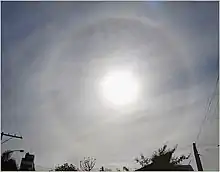halo
English



.jpg.webp)

Etymology
From Latin halōs, from Ancient Greek ἅλως (hálōs, “threshing floor; disk; disk of the sun or moon; ring of light around the sun or moon”), of unknown origin. The threshing floor's circular threshold or oxen walking on it in a circle gave rise to the other meanings. Used in English since 1563; the sense of light around someone’s head since 1646.
Pronunciation
- (UK) IPA(key): /ˈheɪləʊ/
Audio (Southern England) (file)
- (US) enPR: hāʹlō, IPA(key): /ˈheɪloʊ/
- Rhymes: -eɪləʊ
Noun
halo (plural halos or haloes)
- A circular band of coloured light, visible around the sun or moon etc., caused by reflection and refraction of light by ice crystals in the atmosphere.
- (astronomy) A cloud of gas and other matter surrounding and captured by the gravitational field of a large diffuse astronomical object, such as a galaxy or cluster of galaxies.
- Anything resembling this band, such as an effect caused by imperfect developing of photographs.
- (religion) nimbus, a luminous disc, often of gold, around or over the heads of saints, etc., in religious paintings.
- The metaphorical aura of glory, veneration or sentiment which surrounds an idealized entity.
- her halo slipped
- (advertising) The bias caused by the halo effect.
- 2016, National Academies of Sciences, Engineering, and Medicine, Health and Medicine Division, Food and Nutrition Board, Food Literacy: How Do Communications and Marketing Impact Consumer Knowledge, Skills, and Behavior? (page 51)
- In both cases, they found that […] there was a halo effect (e.g., when a "low cholesterol" claim was made, consumers perceived other nutrients, such as fat, also to be at low levels when they were actually high). Andrews reported that these misleading halos were reduced only when the claims were accompanied by an evaluative disclosure […]
- 2016, National Academies of Sciences, Engineering, and Medicine, Health and Medicine Division, Food and Nutrition Board, Food Literacy: How Do Communications and Marketing Impact Consumer Knowledge, Skills, and Behavior? (page 51)
- (art, religion, iconography) a circular annulus ring, frequently luminous, often golden, floating above the head
- (medicine) A circular brace used to keep the head and neck in position.
- (motor racing) A rollbar placed in front of the driver, used to protect the cockpit of an open cockpit racecar.
- (automotive) Short for halo headlight.
Synonyms
- (luminous disc around head of saints in paintings): aureole, nimbus
Derived terms
- halo effect
- halo nucleus
- neutron halo
- nuclear halo
- proton halo
Translations
|
|
|
|
Verb
halo (third-person singular simple present haloes, present participle haloing, simple past and past participle haloed)
- (transitive) To encircle with a halo.
- Synonym: inaureole
Related terms
- halation
Translations
|
References
- Webster's Seventh New Collegiate Dictionary, Springfield, Massachusetts, G.&C. Merriam Co., 1967
- Douglas Harper (2001–2023), “halo”, in Online Etymology Dictionary.
Anagrams
- hola
Bikol Central
Pronunciation
- Hyphenation: ha‧lo
- IPA(key): /ˈhalo/
Interjection
hálo
- Quiet!
Etymology 2
From Proto-Malayo-Polynesian *qahelu.
Pronunciation
- Hyphenation: ha‧lo
- IPA(key): /ˈhaʔlo/
Noun
hâlo
- a pestle
See also
- labok
- lubang
Pronunciation
- Hyphenation: ha‧lo
- IPA(key): /ˈhaloʔ/
- IPA(key): /haˈloʔ/
Noun
halò or halô
- mixture
- Synonyms: salak, ramas
Derived terms
- haluon
- ihalo
- maghalo
Breton
Etymology
From Proto-Celtic *salā (“filth, dirt”).
Noun
halo m
- saliva
References
- Matasović, Ranko (2009) Etymological Dictionary of Proto-Celtic (Leiden Indo-European Etymological Dictionary Series; 9), Leiden: Brill, →ISBN, pages 319
- Revue celtique. (1888). France: F. Vieweg., p 374
Catalan
Verb
halo
- first-person singular present indicative form of halar
Cebuano
Alternative forms
- hawo
Etymology
For the second noun sense, the monitor lizard's timidity likened to cowardice.
Pronunciation
- Hyphenation: ha‧lo
Noun
halo
- a monitor lizard
- (historical) a cowardly tattooed man
Verb
halo
- to mingle
Czech
Pronunciation
- IPA(key): [ˈɦalo]
- Hyphenation: ha‧lo
Etymology 1
From Latin halos.
Noun
halo n
- halo (atmospheric phenomenon)
Declension
| singular | plural | |
|---|---|---|
| nominative | halo | hala |
| genitive | hala | hal |
| dative | halu | halům |
| accusative | halo | hala |
| vocative | halo | hala |
| locative | halu | halech |
| instrumental | halem | haly |
Noun
halo
- vocative singular of hala
Further reading
- halo in Příruční slovník jazyka českého, 1935–1957
- halo in Slovník spisovného jazyka českého, 1960–1971, 1989
Danish
Etymology
Medieval Latin, from Latin halos, from Ancient Greek ἅλως (hálōs, “disk of the sun or moon”).
Noun
halo c (definite singular haloen, indefinite plural haloer, definite plural haloerne)
- halo (atmospheric phenomenon)
Dutch
Etymology
From Latin halos, from Ancient Greek ἅλως (hálōs, “disk of the sun or moon, ring of light around the sun or moon; threshing floor; disk of a shield”), itself of unknown origin.
Pronunciation
- IPA(key): /ˈɦaː.loː/
Audio (file)
Noun
halo m (plural halo's, diminutive halootje n)
- halo (atmospheric phenomenon).
- Similar visual effect resulting from undesirable, roughly circular spots on an imperfectly developed photograph.
References
- M. J. Koenen & J. Endepols, Verklarend Handwoordenboek der Nederlandse Taal (tevens Vreemde-woordentolk), Groningen, Wolters-Noordhoff, 1969 (26th edition) [Dutch dictionary in Dutch]
Anagrams
- hola
Esperanto
Pronunciation
- IPA(key): [ˈhalo]
- Audio:
(file) - Rhymes: -alo
- Hyphenation: ha‧lo
Etymology 1
Of Germanic origin; related to German Halle, Dutch hal, also to Norwegian hall and Swedish hall.
Noun
halo (accusative singular halon, plural haloj, accusative plural halojn)
- (architecture) hall
Derived terms
- enirhalo
- festhalo
- sporthalo
Interjection
halo
- Alternative form of hola
Usage notes
To avoid confusion with the above halo, the authors of the Plena Ilustrita Vortaro de Esperanto recommend including the particle lo or adding a space ("ha lo").
Finnish
Pronunciation
- IPA(key): /ˈhɑlo/, [ˈhɑlo̞]
- Rhymes: -ɑlo
- Syllabification(key): ha‧lo
Verb
halo
- present active indicative connegative of halkoa
- second-person singular present imperative of halkoa
- second-person singular present active imperative connegative of halkoa
Etymology 2
From English halo, from Latin halōs, from Ancient Greek ἅλως (hálōs).
Noun
halo
- halo
Declension
| Inflection of halo (Kotus type 1/valo, no gradation) | |||
|---|---|---|---|
| nominative | halo | halot | |
| genitive | halon | halojen | |
| partitive | haloa | haloja | |
| illative | haloon | haloihin | |
| singular | plural | ||
| nominative | halo | halot | |
| accusative | nom. | halo | halot |
| gen. | halon | ||
| genitive | halon | halojen | |
| partitive | haloa | haloja | |
| inessive | halossa | haloissa | |
| elative | halosta | haloista | |
| illative | haloon | haloihin | |
| adessive | halolla | haloilla | |
| ablative | halolta | haloilta | |
| allative | halolle | haloille | |
| essive | halona | haloina | |
| translative | haloksi | haloiksi | |
| instructive | — | haloin | |
| abessive | halotta | haloitta | |
| comitative | — | haloineen | |
| Possessive forms of halo (type valo) | ||
|---|---|---|
| possessor | singular | plural |
| 1st person | haloni | halomme |
| 2nd person | halosi | halonne |
| 3rd person | halonsa | |
Derived terms
- haloilmiö
Anagrams
- Alho, alho, laho
French
Etymology
From Latin halos, from Ancient Greek ἅλως (hálōs, “disk of the sun or moon, ring of light around the sun or moon; threshing floor; disk of a shield”), itself of unknown origin.
Pronunciation
- (aspirated h) IPA(key): /a.lo/
audio (file)
Noun
halo m (plural halos)
- Halo (atmospheric phenomenon)
- Similar visual effect resulting from undesirable, roughly circular spots on an imperfectly developed photograph
References
- Nouveau Petit Larousse illustré. Dictionnaire encyclopédique. Paris, Librairie Larousse, 1952, 146th edition
Further reading
- “halo”, in Trésor de la langue française informatisé [Digitized Treasury of the French Language], 2012.
Anagrams
- hola, holà
Galician
Verb
halo
- first-person singular present indicative of halar
Ido
Noun
halo (plural hali)
- hall, very large room
Indonesian
Etymology
Borrowed from Dutch hallo. Compare Malay helo.
Interjection
halo
- hello
Latin
Etymology
Possibly a denominative verb from Proto-Indo-European *h₂enh₁-s-lo- (with spurious h), from *h₂enh₁- (“to breathe”), whence animus.[1]
Pronunciation
- (Classical) IPA(key): /ˈhaː.loː/, [ˈhäːɫ̪oː]
- (Ecclesiastical) IPA(key): /ˈa.lo/, [ˈäːlo]
Verb
hālō (present infinitive hālāre, perfect active hālāvī, supine hālātum); first conjugation
- breathe
- emit, exhale, release (gas or fragrance)
- be fragrant
- P. Vergilius Maro, Aeneid, Book I, ll. 416 ff.
- Ipsa Paphum sublimis abit sedesque revisit
Laeta suas ubi templum illi centumque Sabaeo
Ture calent arae sertisque recentibus halant.- [Venus] goes flying back to Paphos and sees happily again her seat
Where there is a temple to her and a hundred altars
That warmly glow with Sheban incense and are perfumed by fresh wreaths.
- [Venus] goes flying back to Paphos and sees happily again her seat
- Ipsa Paphum sublimis abit sedesque revisit
- P. Vergilius Maro, Aeneid, Book I, ll. 416 ff.
Conjugation
| Conjugation of hālō (first conjugation) | |||||||
|---|---|---|---|---|---|---|---|
| indicative | singular | plural | |||||
| first | second | third | first | second | third | ||
| active | present | hālō | hālās | hālat | hālāmus | hālātis | hālant |
| imperfect | hālābam | hālābās | hālābat | hālābāmus | hālābātis | hālābant | |
| future | hālābō | hālābis | hālābit | hālābimus | hālābitis | hālābunt | |
| perfect | hālāvī | hālāvistī | hālāvit | hālāvimus | hālāvistis | hālāvērunt, hālāvēre | |
| pluperfect | hālāveram | hālāverās | hālāverat | hālāverāmus | hālāverātis | hālāverant | |
| future perfect | hālāverō | hālāveris | hālāverit | hālāverimus | hālāveritis | hālāverint | |
| passive | present | hālor | hālāris, hālāre | hālātur | hālāmur | hālāminī | hālantur |
| imperfect | hālābar | hālābāris, hālābāre | hālābātur | hālābāmur | hālābāminī | hālābantur | |
| future | hālābor | hālāberis, hālābere | hālābitur | hālābimur | hālābiminī | hālābuntur | |
| perfect | hālātus + present active indicative of sum | ||||||
| pluperfect | hālātus + imperfect active indicative of sum | ||||||
| future perfect | hālātus + future active indicative of sum | ||||||
| subjunctive | singular | plural | |||||
| first | second | third | first | second | third | ||
| active | present | hālem | hālēs | hālet | hālēmus | hālētis | hālent |
| imperfect | hālārem | hālārēs | hālāret | hālārēmus | hālārētis | hālārent | |
| perfect | hālāverim | hālāverīs | hālāverit | hālāverīmus | hālāverītis | hālāverint | |
| pluperfect | hālāvissem | hālāvissēs | hālāvisset | hālāvissēmus | hālāvissētis | hālāvissent | |
| passive | present | hāler | hālēris, hālēre | hālētur | hālēmur | hālēminī | hālentur |
| imperfect | hālārer | hālārēris, hālārēre | hālārētur | hālārēmur | hālārēminī | hālārentur | |
| perfect | hālātus + present active subjunctive of sum | ||||||
| pluperfect | hālātus + imperfect active subjunctive of sum | ||||||
| imperative | singular | plural | |||||
| first | second | third | first | second | third | ||
| active | present | — | hālā | — | — | hālāte | — |
| future | — | hālātō | hālātō | — | hālātōte | hālantō | |
| passive | present | — | hālāre | — | — | hālāminī | — |
| future | — | hālātor | hālātor | — | — | hālantor | |
| non-finite forms | active | passive | |||||
| present | perfect | future | present | perfect | future | ||
| infinitives | hālāre | hālāvisse | hālātūrum esse | hālārī | hālātum esse | hālātum īrī | |
| participles | hālāns | — | hālātūrus | — | hālātus | hālandus | |
| verbal nouns | gerund | supine | |||||
| genitive | dative | accusative | ablative | accusative | ablative | ||
| hālandī | hālandō | hālandum | hālandō | hālātum | hālātū | ||
Synonyms
- spīrō, feo
Derived terms
- adhālō
- anhēlo
- exhālō
- inhālō
- redhālō
Descendants
- Old French: haler
- French: haleter
References
- “halo”, in Charlton T. Lewis and Charles Short (1879) A Latin Dictionary, Oxford: Clarendon Press
- “halo”, in Charlton T. Lewis (1891) An Elementary Latin Dictionary, New York: Harper & Brothers
- halo in Gaffiot, Félix (1934) Dictionnaire illustré latin-français, Hachette
- Pokorny, Julius (1959) Indogermanisches etymologisches Wörterbuch [Indo-European Etymological Dictionary] (in German), Bern, München: Francke Verlag
Norwegian Bokmål
Noun
halo m (definite singular haloen, indefinite plural haloer, definite plural haloene)
- halo (atmospheric phenomenon)
Norwegian Nynorsk
Noun
halo m (definite singular haloen, indefinite plural haloar, definite plural haloane)
- halo (atmospheric phenomenon)
Polish
Pronunciation
- IPA(key): /ˈxa.lɔ/
Audio (file) - Rhymes: -alɔ
- Syllabification: ha‧lo
Etymology 1
Borrowed from English hallo.
Interjection
halo
- hello? Used to answer the phone.
- Synonyms: proszę, słucham
Etymology 2
Borrowed from Ancient Greek ἅλως (hálōs).
Noun
halo n
- halo (atmospheric phenomenon)
- (literary) halo (the metaphorical aura of glory)
- Synonyms: aureola, gloria, nimb
Declension
Indeclinable.
Etymology 3
See the etymology of the corresponding lemma form.
Noun
halo
- vocative singular of hala
Further reading
- halo in Wielki słownik języka polskiego, Instytut Języka Polskiego PAN
- halo in Polish dictionaries at PWN
Portuguese
Etymology
Learned borrowing from Latin halos, from Ancient Greek ἅλως (hálōs, “disk of the sun or moon”).[1][2]
Pronunciation
- IPA(key): /ˈa.lu/
- Rhymes: -alu
- Homophone: alo
- Hyphenation: ha‧lo
Noun
halo m (plural halos)
- (astronomy) halo (atmospheric phenomenon)
- Synonym: auréola
- (religion, iconography) halo (luminous disc around the heads of saints)
- Synonyms: auréola, nimbo
References
- “halo” in Dicionário infopédia da Língua Portuguesa. Porto: Porto Editora, 2003–2023.
- “halo” in Dicionário Priberam da Língua Portuguesa.
Romanian
Etymology
From French halo.
Noun
halo n (plural halouri)
- halo
Declension
| singular | plural | |||
|---|---|---|---|---|
| indefinite articulation | definite articulation | indefinite articulation | definite articulation | |
| nominative/accusative | (un) halo | haloul | (niște) halouri | halourile |
| genitive/dative | (unui) halo | haloului | (unor) halouri | halourilor |
| vocative | haloule | halourilor | ||
Serbo-Croatian
Noun
halo m (Cyrillic spelling хало)
- (astronomy) halo (atmospheric phenomenon)
Etymology 2
From English hallo.
Interjection
halo (Cyrillic spelling хало)
- (when answering the telephone) hello
Synonyms
- zdravo
- ćao
Spanish
Etymology
Medieval Latin, from Latin halos, from Ancient Greek ἅλως (hálōs, “disk of the sun or moon”).
Noun
halo m (plural halos)
- halo (atmospheric phenomenon)
- halo (nimbus around the head of a holy figure)
Verb
halo
- first-person singular present indicative of halar
Further reading
- “halo”, in Diccionario de la lengua española, Vigésima tercera edición, Real Academia Española, 2014
Anagrams
- hola
Swedish
Etymology
Medieval Latin, from Latin halos, from Ancient Greek ἅλως (hálōs, “disk of the sun or moon”). Related to English and Danish halo.
Noun
halo c (definite singular halon, indefinite plural halor/ haloer, definite plural halorna/ haloerna)
- halo (atmospheric phenomenon)
Declension
| Declension of halo | ||||
|---|---|---|---|---|
| Singular | Plural | |||
| Indefinite | Definite | Indefinite | Definite | |
| Nominative | halo | halon | halor | halorna |
| Genitive | halos | halons | halors | halornas |
Tagalog
Pronunciation
- Hyphenation: ha‧lo
- IPA(key): /ˈhaloʔ/, [ˈha.loʔ] (noun)
- IPA(key): /haˈloʔ/, [hɐˈloʔ] (adjective)
Noun
halò (Baybayin spelling ᜑᜎᜓ)
- mixture (things mixed together)
- Synonym: timplada
- mix (substance added to a mixture)
- Synonyms: lahok, banto, sahog
- mixing; act of mixing
- Synonyms: paghalo, paghahalo
Derived terms
- halo-halo
- haluan
- haluin
- halungtiyang
- ihalo
- kahalo
- maghalo
- maghalo ang balat sa tinalupan
- magkahalo
- makihalo
- mapahalo
- paghalo
- paghaluin
- pagkakahalo
- panghalo
Adjective
halô
- mixed together (by stirring)
Pronunciation
- Hyphenation: ha‧lo
- IPA(key): /ˈhalo/, [ˈha.lo]
Noun
halo (Baybayin spelling ᜑᜎᜓ)
- pestle (for a mortar)
- Synonyms: pambayo, pandikdik, panligis
See also
- mortero
- pambayo
Etymology 3
Borrowed from English hello.
Pronunciation
- Hyphenation: ha‧lo
- IPA(key): /haˈlo/, [hɐˈlo]
Interjection
haló (Baybayin spelling ᜑᜎᜓ)
- hello!
Alternative forms
- helo
See also
- kumusta
- uy
Further reading
- “halo”, in Pambansang Diksiyonaryo | Diksiyonaryo.ph, Manila: Komisyon sa Wikang Filipino, 2018
Anagrams
- laho
Tetum
Verb
halo
- to do, to make
- to build